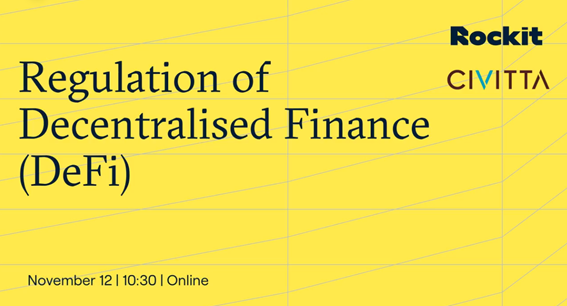On the 12th of November 2020 at 11h30 CET, BlockStart partner CIVITTA organized an online policy workshop in order to collect feedback from key industrial players on the potential and challenges of Decentralized Finance (DeFi). Want to know more about this new trend that has been changing the financial sector all around the world?
In order to collect feedback from key financial industry players, BlockStart partner CIVITTA organized an online panel discussion entitled “Regulation of Decentralized Finance (DeFi)”, on the 12th of November 2020 at 11h30 CET (Brussels Time). The event was co-organized with ROCKIT, the number one space in Lithuania where top fintech innovators, creators and founders build the future of financial technologies. By joining forces with CIVITTA, ROCKIT’s community helped BlockStart achieve a higher engagement of ecosystem members in the policy workshop.
The objective of the panel discussion was to articulate the emerging trends on the market, focusing on the relevant regulatory instruments that are already in place and areas where regulation is missing regarding decentralized Finance, or DeFi, as it is commonly used. The panelists were challenged to discuss the improvements needed and rethink whether the current framework that is in place to regulate the decentralized market needs to be re-assessed.
The panel discussion was led by Vytautas Černiauskas, expert at CIVITTA and included the following professionals: Audrius Šilgalis, Head of Investment Services of Bank of Lithuania, Oleg Marofejev, Chief Product Owner for Open Banking of Swedbank Lithuania, and Sumit Kishore, Head of Operations at Consensys, a blockchain solution provider.
The discussion started with the overview of the DeFi and how it is complementing and challenging the
financial sector. According to our panelists, in order to keep up with the new trends, the researches and key studies are being conducted to fully understand what’s the position of the traditional bank in the financial innovation world and how to act on certain changes to maintain competitive position. The lively discussion continued with an attempt to define what financial innovation actually means and by describing the main challenges facing the regulator and the need to balance the flow of innovation and ensure customer protection. Finally, the issues in DeFi and other similar innovations in the fintech area that innovators face from a regulatory point of view, such as missing clarity on the regulatory framework that the companies have to follow, where also highlighted.
While the discussion touched upon a variety of issues, the following key problems can be singled out:
- The current regulatory tools are not suited for many DeFi solutions.
- There is a strong need to ensure prevention of money laundering, financial crimes and financing of terrorism as well as and having proper Know Your Customer (KYC) procedures, the need to understand who you are working with.
- Ensuring security, consumer trust and consumer protection and protection of their data are key priorities of the regulation. The rights of customers need to be ensured so that they can fully benefit from the DeFi solutions.
- Lack of central authority and regular interaction between the innovators and the regulators. Supervisors need to have contact with the DeFi companies to help them understand and implement regulatory requirements and who, on their end, can explain the solutions and logic behind the models they use.
- Lack of clearly defined regulatory framework and guidelines as the supervisory authorities are still learning and preparing regulation.
- From a regulation perspective, it is very difficult to understand how a regulator could apply regulatory powers and supervisory capability to a technology protocol that enables lending against assets without a lender (i.e., based almost entirely on an aggregate market value of assets mediated by way of a smart contract only).
- Other inquiries into the subject matter emphasize that a more decentralized financial system may reinforce the importance of an activity-based approach to regulation, particularly where it delivers financial services that are difficult to link to specific entities and/or jurisdictions. Certain technologies may also challenge the technology-neutral approach to regulation taken by some authorities.
What an interesting policy workshop this was! The participation of a legislator, a traditional financial institution and a blockchain innovator ensured a complementary and inclusiveness of views, making sure that regulator and innovators angles were presented, and providing much needed policy recommendations on this blockchain-related area of Decentralized Finance. More information on this, please read our public Deliverable 5.7 – Policy Recommendations (1st version).
If you want to take a look at this panel discussion, you can take a look at the policy workshop’s video recording below.
Follow us on social media – Twitter | Facebook | LinkedIn – or visit our events webpage to keep track of upcoming events on blockchain and other DLTs regulation trends and challenges.
